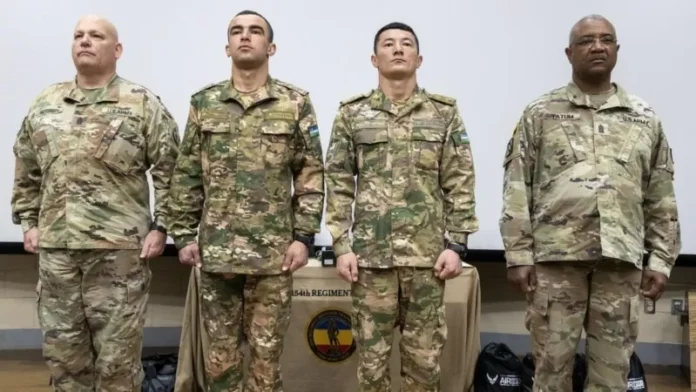Uzbekistan: A Key Strategic Partner for the United States in Central Asia
The Trump administration’s engagement with Central Asia has brought to light the growing importance of Uzbekistan as a key strategic partner for the United States in the region. With its “enhanced” political dialogue, security cooperation, and strong connection with the Mississippi National Guard, Uzbekistan has emerged as a reliable ally for the U.S. in this complex region.
In recent months, there have been several bilateral exchanges between the two nations, highlighting the significant role that Tashkent plays in Washington’s Central Asian policy. The most recent transfer of seven Black Hawk helicopters from Uzbekistan, which were previously used by Afghan military pilots fleeing the Taliban, has underscored the country’s strategic importance for the U.S. According to U.S. officials, this transfer and other exchanges have solidified Uzbekistan’s position as a key partner in the region.
Diplomatic Engagement
The U.S. and Uzbekistan have been engaging in discussions through the C5+1 diplomatic platform, which was launched nearly a decade ago between Washington and five Central Asian republics. In a phone conversation on February 21, U.S. Secretary of State Marco Rubio and Uzbek Foreign Minister Bakhtiyor Saidov discussed the joint effort to support a more peaceful and prosperous Central Asia. The U.S. reiterated its support for Uzbekistan’s independence, sovereignty, and territorial integrity, highlighting the strong partnership between the two nations in all spheres.
Saidov described the conversation as “candid and productive,” with a focus on expanding the strategic partnership between the two nations in all areas, including building strong bridges between business communities, increasing trade volume, and ensuring prosperous development in Central Asia.
Military Cooperation and Ties with Mississippi
Uzbekistan’s cooperation with the Pentagon and its ties with the Mississippi National Guard have been crucial in strengthening the relationship between the two nations. Uzbek Ambassador Furqat Sidikov has emphasized the country’s commitment to standing shoulder-to-shoulder with the Mississippi National Guard, citing joint exercises and professional exchanges sponsored by the Pentagon. He also highlighted the defense reforms and improvements in the Uzbek military’s equipment as a testament to their strong partnership with the U.S.
At a January 31 embassy reception, Mississippi National Guard Adjutant General Major General Bobby Ginn praised the partnership, stating that since 2012, the two nations have facilitated over 170 engagements, strengthening disaster response and readiness.
Uzbekistan’s commitment to regional stability and its contributions to counterterrorism efforts and border security have also been acknowledged by U.S. officials. The U.S. is committed to working with Uzbekistan to ensure its stability and sovereignty, as well as that of the entire Central Asian region.
The Afghanistan Factor
The recent transfer of Black Hawk helicopters back to the U.S. from Uzbekistan has been a significant development in the region. However, Uzbek officials have been cautious in their approach to avoid any tension with the Taliban, who have condemned the handovers as an infringement on Afghanistan’s sovereignty. The Taliban’s Defense Ministry issued a statement denouncing the transfer and demanding the return of the aircraft.
While the transfer of 18 U.S. aircraft to Tajikistan in 2021 has yet to be settled between the two nations, U.S. Central Command commander General Michael Kurilla has stated that the aircraft will not be returned to Afghanistan. Instead, the U.S. hopes to hand over some or all of the aircraft to the Tajik government. This highlights the importance of Uzbekistan as a trusted partner for the U.S. in the region.
Uzbekistan’s Cautious Approach
Uzbekistan’s cautious approach towards the Taliban has been supported by experts in Tashkent. While the country does not officially recognize the Taliban, it has forged stable diplomatic relations with Kabul, holds significant investment and business agreements, and provides humanitarian aid to the Afghan people. The country has also opened a free economic zone in the city of Termez, inviting neighboring countries to foster entrepreneurial cooperation.
U.S. Interests and Central Asian Security
The U.S. has maintained military cooperation agreements with each Central Asian republic, with plans reviewed annually and subject to funding approval. Despite intelligence-sharing efforts, there is no U.S.-Uzbekistan overflight agreement, and Tashkent does not allow its territory to be used for strikes on neighboring soil, even against terrorist targets. This has raised questions from the Trump administration, as it complic

